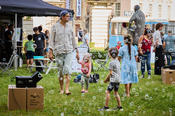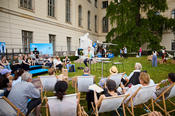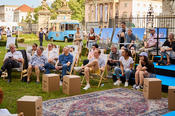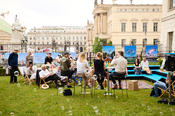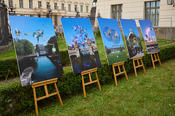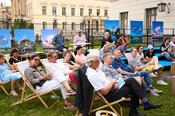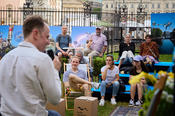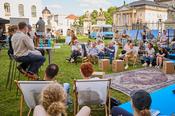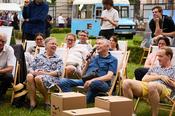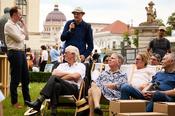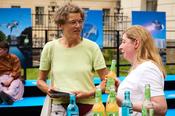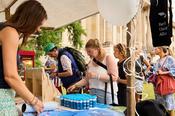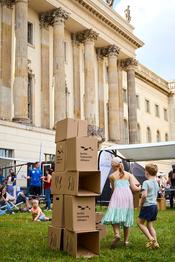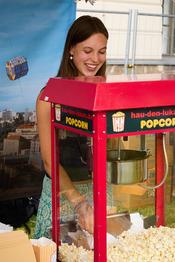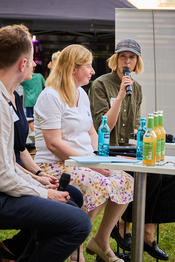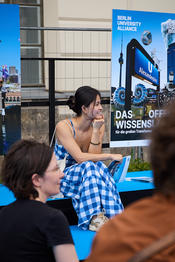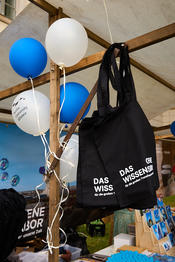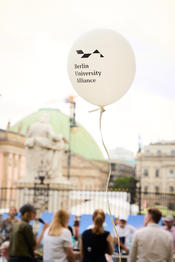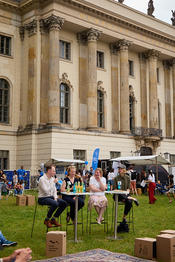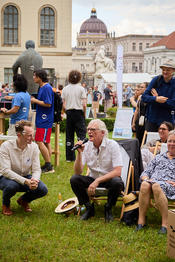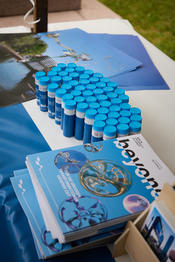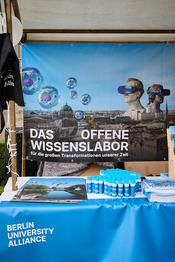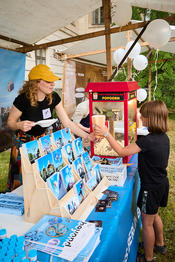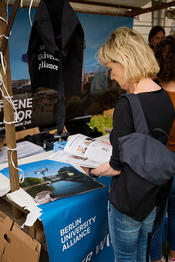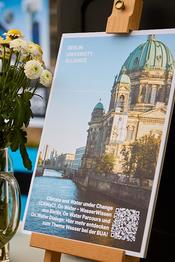Review of BUA Open Space: Water for everyone?
We take water coming out of the tap for granted – but for how much longer? Resources are becoming scarcer in Berlin and the surrounding area too: less rain, falling groundwater levels, and growing demand from the population, industry, and agriculture are putting pressure on the system.
At the BUA OPEN SPACE during the Long Night of Science on June 28, 2025, we invited our audience to discuss the future of water in Berlin with researchers and stakeholders from politics and culture.
Who was there?
The panel consisted of Prof. Dr. Irina Engelhardt, hydrogeologist at TU Berlin, Frauke Bathe, head of the Water Management and Geology Department at the Berlin Senate Administration, and Dr. Anna-Lisa Dieter, curator at Humboldt Labor. The discussion was moderated by Mads Pankow.
During the discussion, it became clear that the low rainfall in the Berlin-Brandenburg region is a problem—but on this evening, we were glad that the weather was warm and dry and that our event in front of the main building of HU Berlin did not get rained out.
Everything’s fine – or is it?
Water flows reliably from our taps, and we see water around us every day in the Spree, Landwehr Canal, Havel, and Brandenburg lakes. Is there really a problem with the water supply? Moderator Mads Pankow opened the evening with this question. Frauke Bathe from the Senate Administration replied: There is no reason to panic, but in order for the supply situation to remain as it is, we need to take action and raise awareness of the need to use water more sparingly. However, the fact that the Spree is in such good condition is also due to the fact that it is dammed.
Hydrogeologist Prof. Dr. Irina Engelhardt took a much more serious view of the current situation: Until now, bank filtration—the extraction of groundwater near rivers and lakes, in which pollutants are filtered out as the water passes through the soil—has reliably secured the water supply. However, the groundwater level is falling, and the Spree in particular is heavily dependent on water supplies from Lusatia.
Structural change in Lusatia
The background: During lignite mining in the region, so-called drainage water is pumped out and discharged into the Spree—an artificial tributary that has stabilized the river system to date.
With the planned phase-out of lignite by 2038, this water source will disappear completely. This is a fundamentally positive development for the climate and the environment – but it will have significant consequences for the future water supply in Berlin-Brandenburg. According to Engelhardt, this new reality must now be thought through and planned with foresight.
Water is an issue that affects everyone
Dr. Anna-Lisa Dieter is the curator of the exhibition “On Water. WasserWissen aus Berlin” (Water Knowledge from Berlin), which opens at the Humboldt Forum in October. “What interested you about the topic of water?” asked moderator Mads Pankow. Water is an important topic in Berlin research, replied Anna-Lisa Dieter. A balance has been lost; we are currently facing both too much and too little water, and research in various disciplines is addressing this issue.
Brandenburg – a problematic case
Why is Brandenburg particularly affected by water shortages, Mads Pankow asked Irina Engelhardt. The region has comparatively low rainfall, she replied, a dry, continental climate, high summer temperatures — and high evaporation due to the evergreen coniferous forests. In addition, Brandenburg is a flat region that is not suitable for the construction of dams. The state is heavily dependent on natural lakes and rivers, which, however, repeatedly struggle with water shortages due to drought and insufficient rainfall. The result: water is a structurally scarce commodity here.
Water, society, and culture
Anna-Lisa Dieter focused on the social and cultural dimensions of the water issue. She spoke about the tension between science and activism – a topic that will also play a central role in the upcoming exhibition “On Water. WasserWissen in Berlin” at the Humboldt Forum.
An interdisciplinary team is currently working on granting the Spree river its own rights and legal dignity – analogous to the discussion about river rights in other parts of the world. Lawyers are examining how the preservation of the Spree habitat could be legally enforceable and represented in court.
How is the city of Berlin taking action?
Frauke Bathe described the current strategy of the Berlin administration: The focus is currently on communication, including via Berliner Wasserbetriebe, rather than on regulatory requirements.
Irina Engelhardt added that legal frameworks such as the Water Resources Act make it difficult to prohibit water extraction. Controlling pricing, on the other hand, is legally possible and has long been common practice in other countries.
The lively participation of the audience showed that the topic of water is of great interest. One of the questions was: How much water does agriculture actually consume? According to Engelhardt, this varies greatly: In northern Brandenburg, the share of water consumption is 20%, while in southern Brandenburg it is only 2.5%. However, with the goal of expanding regional agriculture, this demand will increase significantly.
Another topic: Why is rainwater – e.g., from roofs – not used more extensively?
Decentralized rainwater management is complex, according to Bathe. The city has no direct access to private properties. However, the issue is being actively addressed through the Rainwater Agency.
What are the possible solutions?
With its “Water Master Plan", the city of Berlin has presented a comprehensive strategy for responding to future challenges. The plan contains 32 measures, including:
– upgrading sewage treatment plants
– improving rainwater management
– unsealing surfaces
– and limiting water withdrawals
These are so-called “no-regret measures", explained Bathe – steps that are sensible and effective regardless of how the situation develops.
Research is also providing concrete approaches: Irina Engelhardt presented the principle of artificial groundwater recharge. This involves the targeted infiltration of heavy rainwater to replenish the groundwater table – with the aim of being able to use it again downstream. An effective and comparatively well-accepted measure, according to Engelhardt.
A complex issue that requires cooperation
The discussion highlighted the complexity of the future of water supply and the many social, political, and technical aspects that come into play.
“Water for everyone?” was not only the title of the evening – it was also an invitation to reflect together on responsibility, scope for action, and solutions for the future.

